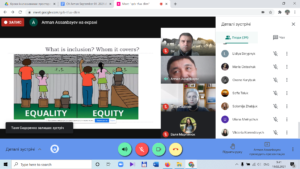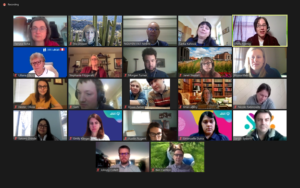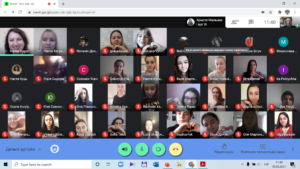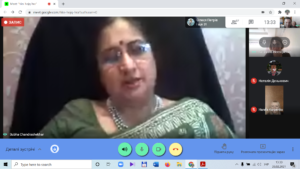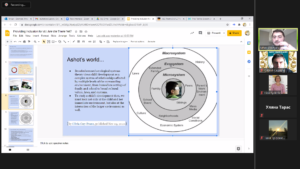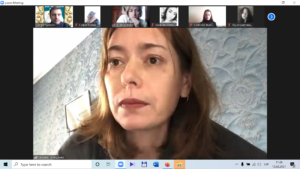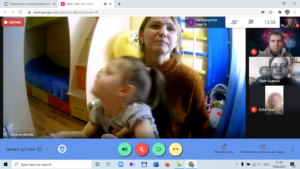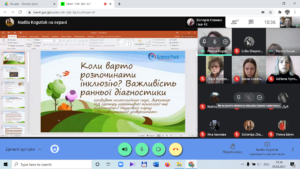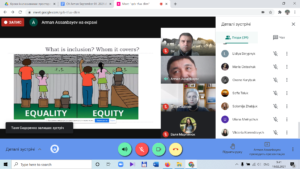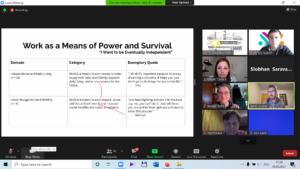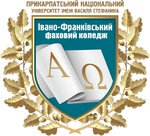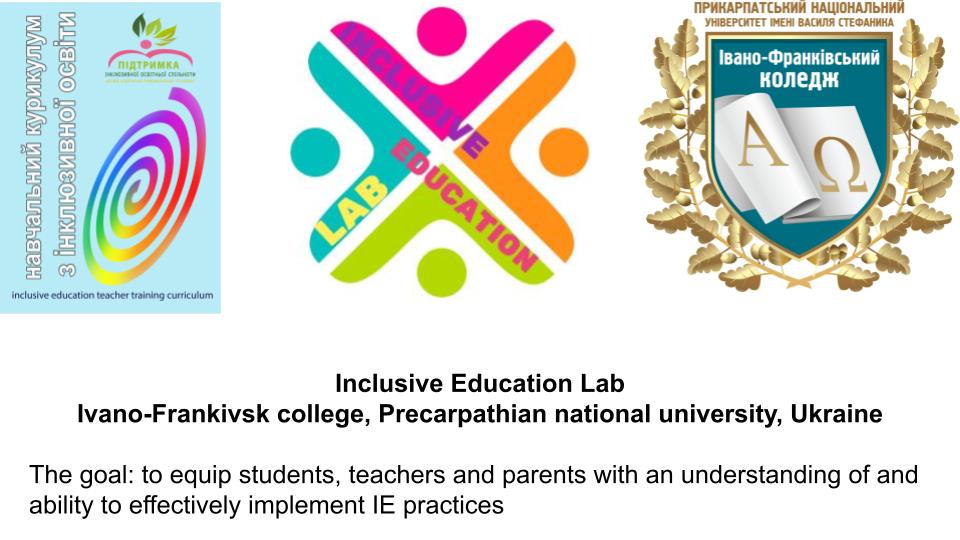
Quite a number of events were hosted by the Inclusive Education Lab in Ivano-Frankivsk college, Precarpathian national university in February 2021 as the Inclusive Education March is underway.
The Lab was created after the successful completion of Without borders: sustaining and supporting inclusive education learning community project supported by the Public Affairs Section of the U.S. Embassy in Ukraine with the overall goal to support the inclusive education learning community of diverse education professionals to work with students with disabilities and their parents as well as introduce the training program focused on the high fidelity implementation of promising and evidenced-based inclusive education practices in Ukraine.
The Inclusive Education Lab cooperates with Ukrainian National Inclusive Education Consortium, USG Exchange Programs Alumni, members of Inclusion without Borders community and the Global Resource Center, Institute on Community Integration, University of Minnesota. It is expected to have the capacity to equip students, teachers and parents with an understanding of and ability to effectively implement inclusive education practices. Among the areas of the Lab activities are teacher training and raising awareness as well as support and transition of students with disabilities to independent living, further study and employment. The Lab provides pre-service and in-service teachers with the resources developed as the result of the project activities and welcomes people with disabilities to study and work in the college, participate in workshop activities and share experience.
In February the college and university students as well as participants from all over Ukraine had an opportunity to attend online lectures by international experts from U.S., Armenia, Kazakhstan and India.
Arman Assanbayev, ADA Anniversary Inclusive Education Program fellow spoke on The Role of Disability Support Centers in Facilitating Inclusive Education in Kazakhstani Higher Educational Institutions, the Experience of the USA and Nazarbayev University. The online lecture has been the first step of cooperation between international fellows since the COVID outbreak and is viewed as the sign to remove barriers in education and employment for people with disabilities.
The students and teachers familiarized themselves with Kazakhstani education system, programs of studying and applying for grants in Nazarbayev university, statistics on disability, research in the field of inclusion, backgrounds and prospects of inclusive education, importance of equity, the fellow’s Grand Challenge, its outcomes and the recent renowned social project “Schools without Borders. 1+1”.
Arman’s plans and efforts to develop Disability Support Centers and transition services in his country caused interest and understanding of his Ukrainian counterparts. We found we can mutually benefit from the experience cooperating in providing university students with and without disabilities with relevant services concerning independent living, self sustainment and transition to employment.
The students also learned about Arman’s research and volunteering as well as his passion for philosophy and history, so they are ready to invite our Kazakhstan friend to lecture on these topics too.
Mher Davtyan, the second expert and independent specialist in educational leadership delivered an online lecture Providing Inclusion For All: Are We There Yet? The session defined the current global crisis of providing learning for all and its root causes. It discusses Louise Stoll’s ‘developing capacity for learning’ framework as a solution. The participants were engaged in understanding the socio-ecological environment of children and challenges within. The interaction with Ukrainian students helped to understand the inclusion as the multidimension tool for healing the global wounds and pave the roadmaps for unpredictable, yet our common future.
Mher Davtyan started his career as an English teacher in 2015. Getting his MA in Teaching English as a Foreign Language from the American University of Armenia he came back to his community in the north of Armenia to start an alternative after-school English programme for students to learn English in an inclusive and communicative environment. In 2017 he was part of Americans with Disabilities Act Inclusive Education US State Funded Fellowship where he explored inclusive practices in Minnesota. Coming back to Armenia, Mher worked as a Leadership Development Manager for Teach For Armenia to build leadership and teaching capacity in Teach For Armenia teacher-leaders working in the most underserved schools of rural communities. Mher was engaged in an expert group funded by UNICEF Armenia to consult the Ministry with transition into general inclusion in public schools in Yerevan in 2018, where he also co-designed a new model for continuous inclusive teaching capacity development through targeted in-service intervention and mentoring. Currently, he is a Chevening award winner by the UK Foreign Commonwealth Development Office and does his MA in Educational Leadership in University College London, Institute of Education.
Subha Chandrashekhar was the third international speaker that gave the online lecture to Ukrainian audience of Ivano-Frankivsk college students and teachers as well as members of Ukrainian national consortium of inclusive education, The event was organized by Inclusive Education Lab aimed to build the capacity of teachers to effectively implement inclusive education practices.
Ms. Subha Chandrashekhar, HOD Dept of Mental Health, Delhi Public School Rohini has over 25 years of experience in the field of inclusive education as a trainer and leader involved in capacity building of Policy makers, School Leaders, General Education teachers, Special Educators and parents. A registered Rehabilitation Practitioner and Special Educator with the Rehabilitation Council of India, she is a ‘Fulbright Distinguished Awards Scholar from Arizona State University and an Americans with Disability ADA fellow in inclusive education from the University of Minnesota. In both universities, she researched and completed her inquiry projects on Universal Design for Learning.
She has extensive experience in establishing inclusive strategies and policies at Pre-Primary, Primary, Secondary and Higher Secondary levels to ensure that schools continue to provide inclusion to learners from marginalized groups including students with special needs and learners from backgrounds of social, cultural, economic deprivation. This involves improving teacher performance through routine training and evaluation. She has been training teachers to use the principles of Universal Design for Learning while making lesson plans to teach students in inclusive classrooms.
She has received the “Role Model Teacher Award’ from the Delhi Public School Society , the International School Award from British Council for supporting the integration of international learning in the Curriculum and the “Bharat Nirman Award” for outstanding contribution in the field of Inclusive and Special Education. She is the Founder-Director of ‘ANUGRAHAM’, an initiative to spread awareness and empathy towards acceptance of students with diverse abilities. Through capacity building programs, ANUGRAHAM aims to empower Special Educators, general educators and parents. Sustainability, friend- and partner- ship – these are the triggers. Let’s make the future thanking ADA anniversary inclusive education fellowship!
Sergiy Sydoriv, presented at the Dignity of Work along with key international experts from diverse academic, government and non-government organizations, parents, employees and employers to discuss challenges and opportunities facing people with disabilities around the world.
The Dignity of Work, an online forum hosted by the Institute on Community Integration, University of Minnesota (USA) highlighted global success stories, the families behind them, and the employers who have discovered the power of a diverse workforce from the USA, Peru, Brazil, Tanzania, Japan, Vietnam, Russia, Czech Republic and Ukraine.
Choosing to work and be supported in this choice is a fundamental human right for all people regardless of race, gender, disability.
The presenters from Ukraine talked about action steps to be made in education, employment and policy. These areas are interconnected and each action has its ultimate effect in all. The pandemic, the subsequent economic recession, needs of social distancing – these factors have deteriorated greatly the quality of life and created new barriers. In order to survive, humanity had to lock down many of its activities and halt common social services. At the same time the distancing that everybody had to experience during the lockdown created some opportunities for people with disabilities to show their effectiveness and prove their skills.
To live with dignity means that people with disabilities have the right to work without discrimination and are entitled to fair wages and equal pay. Society needs to create and ensure special conditions for people with disabilities to be able to work and express their potential. Assistive equipment and technologies created for people with disabilities will enable them to perform quality work and be effective on the labor market.
Cooperation with School of Equal Opportunities, the NGO that promotes human rights and empowers youth, women and persons with disabilities on a grass-root and government levels. Efforts in transition to employement of Kharkiv’s Art for autism workshop, National University «Yuri Kondratyuk Poltava Polytechnic», Kalush special school were also presented.
At the networking sessions participants discussed strategies employers use to hire and retain people with disabilities, preparation of youth with disabilities for employment, overcoming barriers when seeking competitive employment, empowerment of people with disabilities through employment.
